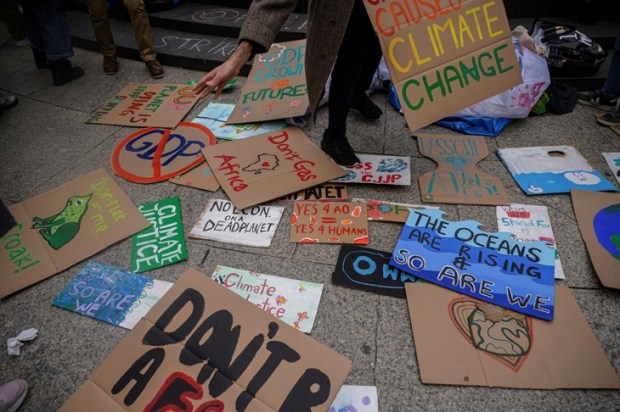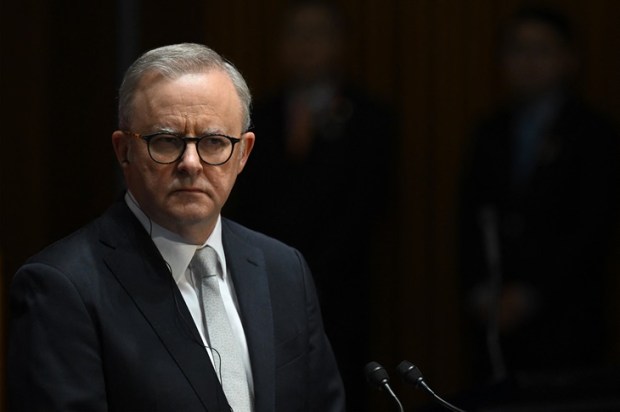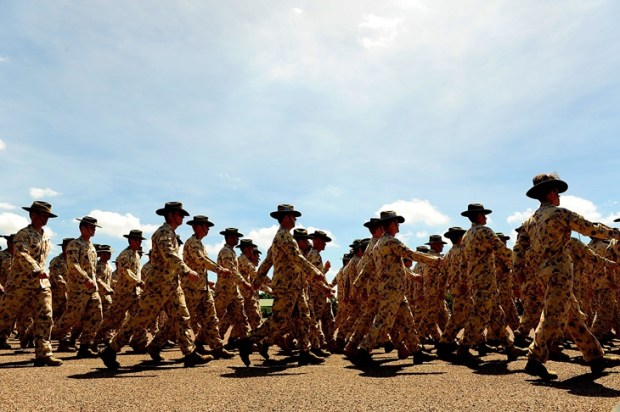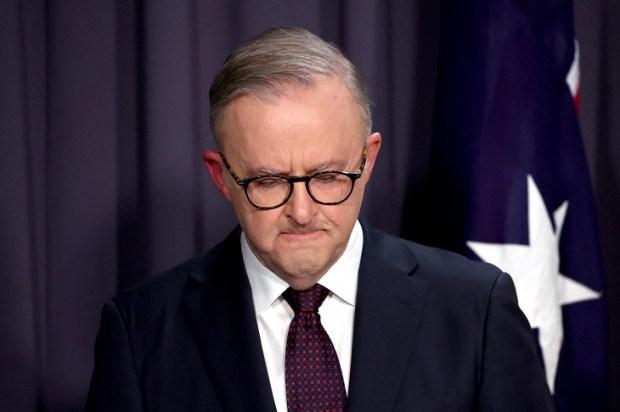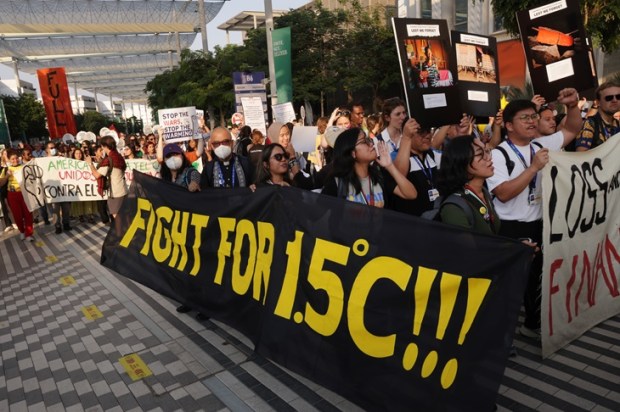‘This … is … a … war!’ declared the noxious, and putative Senator, Lidia Thorpe. And she’s right. It’s been going on in earnest since the 1960s, meticulously revealed in Keith Windschuttle’s The Break-Up of Australia.
And this Voice referendum is the latest, and possibly seminal, battleground.
I don’t want to get ahead of myself, but it seems the referendum is headed for defeat, possibly a very serious defeat. So wise heads, if there are any, on both sides of politics should be turning their minds on how to manage defeat/victory. We collectively need to win the peace, as it were.
And there will be a big job to do. This issue, this political zombie will not just slink away to die in the darkness following a referendum defeat. We cannot, or at least should not, go back to business as usual.
The last significant proposed change – the so-called Australian Republic – bolstered by apparent widespread support, failed spectacularly. Its supporters, although disappointed, accepted the result and quietly got on with working towards a new attempt, as is their right.
But the failure of this referendum will not be accepted with quiet resignation and a determination to simply legislate the Voice as a consolation prize. It will be attended by shrieks of racism, protests, and possibly violence. Prime Minister Albanese trivialised this complex proposal when he described it as ‘only good manners’, ‘a hand outstretched in friendship’, and a ‘generous invitation on the part of our First Nations people’. Albanese is playing with fire here. By treating this as a moral issue and by selling it as a simple proposition and just good manners, rather than what it really is if it gets up – a significant change to our Constitution and a major concession to Aborigines – he is failing in his duty to manage expectations. He has said ‘a defeated referendum would be devastating to Indigenous communities’. And he is right, at least as far as the activist communities are concerned. They will see a defeat as a rejection of Aboriginal people. As nothing more than racism – Dr Marcia Langton has already signalled that. They will also be angry, but not at Albanese. They could hardly blame him for the failure of the campaign because he danced entirely to their tune throughout. However, if it fails and violence does break out, Albanese will bear much of the responsibility for this. I wonder if Cabinet is putting its mind to how it will prevent this from happening? That is not evident from the fact that, at the time of writing, Albanese is continuing with his empty feel-good rhetoric and barely acknowledging the appalling behaviour of ‘Yes’ supporters at a recent ‘No’ campaign event in Adelaide. This behaviour is symptomatic of what I fear, but in spades, following a referendum defeat.
It seems to me that both sides of politics should refrain from finger-pointing, point-scoring, or refighting the campaign. Labor will have to go against all its Leftist instincts to do this. But here is the essence of Albo’s concession speech, if he’s man enough to deliver it:
Fellow Australians, I share the disappointment of many of you that we failed to convince enough voters to recognise our First Nations Peoples in the Constitution by establishing a Voice to Parliament. However, this was a democratic process in which both sides had ample opportunity to make their case. I hope you all will accept this decision with grace. And I promise that, in order to ‘close the gap’, at the next election I will present a fully detailed Voice that my government will legislate if re-elected.
Let me be clear, I don’t support a legislated Voice myself, but if Albanese fails to voice this last commitment he will be exposed as a charlatan who peddled a false justification for this most divisive referendum.
And here is Peter Dutton’s:
Fellow Australians, I understand the disappointment of many of you on the ‘Yes’ side of the referendum. However, this was a democratic process in which both sides had ample opportunity to make their case. I hope you all will accept this decision with grace. And I promise that prior to the next election the Coalition will release a comprehensive policy designed to ‘close the gap’.
And, of course, the same applies in the event of a referendum win.
And here I’m going to go out on a limb. It seems to me that a major defeat for the referendum will offer the opportunity for the Coalition to reset the debate. After the dust has settled, of course. During the immediate aftermath, Opposition Leader Peter Dutton should make no offers to the Aboriginal elite, such as some form of preambular recognition or establishment of regional Voices. They’ll only throw them back in his face in any case. He should spend at least 12 months developing Coalition policy.
The first thing Dutton should do is commission some serious polling to understand why people voted ‘No’. I would not be surprised if he finds that a significant factor would be antipathy towards the relentless ‘Aboriginification’ of our community life.
I suspect that one of the major factors contributing to the very negative polling trend throughout the campaign so far has not related to the Voice itself, but to the revulsion ordinary people are starting to feel at the constant imposition of Aboriginal themes into every facet of our lives. People are jack of the Aboriginal and Torres Strait Islander flags being given equal prominence with the Australian flag, of the constant Welcomes to Country and acknowledgements of traditional owners, the renaming and double naming of cities, exclusion from famous natural features, Indigenous football rounds, special theatre pricing and so on, almost ad nauseam. All of these things have been imposed without any input or concurrence from the Australian people. All of these apparently benign concessions, in particular references to First Peoples or First Nations, provide a fertile host environment for the more strident and dangerous demands that underpin the Voice referendum, and which will continue after the referendum unless checked. And, together, they paint a false and patronising picture of Australia as a country based upon Aboriginal tradition, when, in fact, the opposite is the truth.
Coming to an agreed Coalition policy on all these issues will be a complex task and, unfortunately given the propensity of some Liberal and National members, some compromises will be necessary.
But there are a couple of things that should be non-negotiable. The Coalition policy should make it clear that it will not, under any circumstances, support treaties or truth-telling commissions. That it will not pay reparations.
As John Howard said, countries do not make treaties with their own citizens. At present, Aborigines living a bastardised version of their traditional lifestyle have control over the use of, and access to, their Native Title land. And they get substantial royalties as well as other payments and services from Commonwealth and State governments. What more do they expect from treaties other than some form of self-government? Experience of self-determination has suggested that even more of the same is unlikely to result in anything other than ‘failed state’ status.
As to truth-telling, history is not set in concrete. There cannot be, other than in a totalitarian state, an ‘official’ version of history, which is what truth-telling purports to achieve. If we strive to acknowledge the crimes and errors of the past, which we should do, then the study of history, argued in the halls of academia, is the place to do it. Not in some semi-judicial forum. We do not need to apologise for the past – just learn from it. And, by the way, there is no shortage of historians falling over themselves to uncover every transgression against Aboriginal people. The truths they tell are arguable, often questionable.
Over and above that, here is my wish list of what I would also like to see in a Coalition Aboriginal Affairs policy platform. And I do not underestimate the political difficulties involved. I accept that some genies can’t be put back, but that should not stop us trying.
Dutton could state that the Coalition will not, under any circumstances, support Constitutional recognition of Aboriginal People in other than a symbolic preambular form (which, I hasten to add, I oppose). Furthermore that, if elected, a Coalition government would conduct plebiscites on the discontinuance of the official status of the Aboriginal and Torres Strait Islander flags and while he’s at it, just to test the widely touted assertion that everyone supports it, preambular constitutional recognition.
He should declare that a Coalition government would not recognise, nor use, the terms First Nations or First Peoples but rather, and only when necessary, Aboriginal Australians or Torres Strait Islander Australians. Ditto for ‘reconciliation’, whatever that means.
He should repudiate the UN Declaration on the Rights of Indigenous Peoples.
He should commit to an inquiry, as recommended by Senator Jacinta Price, into how money already allocated for Indigenous welfare is spent and accounted for. He should commit to an inquiry into the issue of native title and the workings of the Native Title Tribunal.
At the moment, Aboriginal politics is a rat’s nest. We have individual states negotiating or planning treaties with a subset of their population. This cuts across national sovereignty. Possibly the best example of this is the ‘treaty’ supposedly negotiated between the Victorian government and the Aboriginal people of the Wimmera.
Dutton should seek legal advice with a view to mounting a High Court challenge to any state-based treaties. Not being a constitutional lawyer, I cannot see any obvious Constitutional provision that might apply in this case, but it seems to me that these state-based initiatives, giving a form of sovereignty to a subset of their population, based on race, offends against the spirit of Federation as stated in the preamble:
WHEREAS the people of New South Wales, Victoria, South Australia, Queensland, and Tasmania, humbly relying on the blessing of Almighty God, have agreed to unite in one indissoluble Federal Commonwealth under the Crown of the United Kingdom of Great Britain and Ireland, and under the Constitution hereby established…
And he should commit to establishing, through a national convention, an Australia-wide position on Aboriginal affairs. In 1967 we had a Department of Aboriginal Affairs. Implicit in that title was the idea that government made laws for the benefit of individual Aboriginal people, to bring them to the same standard of living as every other Australian. Now we have the Minister for Indigenous Australians and ‘Aboriginal affairs’ has morphed into Aboriginal politics. We now make laws, in 9 different jurisdictions, designed to foster a separate group identity, with commensurate group rights, for some people based on their ancestry. Designed to give them distinct rights unavailable to other Australians. This cannot be allowed to continue.
According to Professor David Flint, Prime Minster Robert Menzies wanted to eliminate Section 127 but was opposed to the change to Section 51(xxvi) in the 1967 referendum, because he believed that, under a Federation, states were best placed to handle Aboriginal matters and that the Commonwealth could assist by giving them tied grants. As the Prime Minister who conducted the referendum, Harold Holt was persuaded to include the change to Section 51(xxvi). And the result is that we have seen Aboriginal dysfunction in remote and regional areas burgeon since then as the emphasis of the descendants of those who lobbied for the change has shifted from Aboriginal advancement to Aboriginal power.
Here’s a radical idea. Far from removing the so-called ‘race power’ (Section 51(xxvi), we should strengthen it to be an exclusive power of the Commonwealth, removing from the states any power to effect legislation uniquely in respect of any race. That way we can ensure that whatever special treatment or privileges are afforded to Aboriginal people are consistent across the country. Even those who support the Aboriginal agenda might concede that consistency is a worthwhile objective.
I don’t mean to be glib or simplistic. I don’t think this is an ideal solution – we should not have racial differences in any form. It will not guarantee that future Commonwealth governments will not be stupid enough to negotiate treaties, pay reparations or cede some form of sovereignty. And it would probably not stop state governments from enacting such atrocities as the WA government’s recent and ill-fated Aboriginal Heritage Protection Act. But at least we can limit the potential for damage. We can ensure that these anti-Australian demands can be managed from a national perspective. That we cannot have separate aboriginal sovereignty in any form imposed on us by stealth or via the back door.
Or, failing a constitutional amendment, Dutton could promise to legislate the Equality of Citizenship Act, under Section 51(xxvi), which would prevent a State or Territory government from ceding any special political power to the people of any race.
All of the above is an ambitious agenda and I accept some compromises will be necessary. For example, I would not die in a ditch fighting against the use of First Nations terminology. But I would not make this extensive ambit claim unless I believed that the way we are heading will lead to the break-up of Australia. And, trust me, I do not underestimate the hurdles that this initiative would have to overcome. But we at least need to start a national conversation on this issue. Defeat of this referendum, God willing, might just provide the trigger to start that conversation. And the place to start it is within the Liberal and National party branches. And it must be led by a leader of Howard like tenacity, courage and intellect. Is Peter Dutton that man? With Senator Jacinta Price at his back, there is no reason why he shouldn’t be.
I know that would be confrontational. It was put to me that such an agenda would have to be offset by offering something in return. I agree. What is needed is a concerted effort to close the gap for that 20 per cent of Aborigines who still lead dysfunctional (not disadvantaged) lives. Assimilation – not into Western culture per se but into the modern economy – is the best means by which this can be achieved. Does anyone my age not believe that things have gotten worse since the Hasluck model was abandoned for the Coombs model? There is nothing in the modern economy that precludes Aboriginal people from practising the benign aspects of their culture.
What is behind this current rhetoric is an international ‘de-colonisation’ movement. However, this theory is a self-evident chimera. Even countries (mainly in Africa) that have expelled the colonial power are nonetheless inextricably locked into a post-colonial world. The reason many of them are failing is that they have either ignored the institutions that were bequeathed them by the colonial power, or they have corrupted them to fit into some kind of hybrid society.
It was the intrusion of the modern world, not colonisation per se, that traumatised Aboriginal society. That was always going to happen one way or another. Colonisation effectively ceased at about Federation. What is now routinely referred to as ‘intergenerational trauma’ on the part of Aboriginal people many generations removed from 1788, is actually intergenerational dysfunction inherited from familial behaviour. If we operate on the wrong diagnosis – trying to undo colonisation – we will continue down the wrong path. At least 80 per cent of those who claim to be victims of colonisation owe their very existence to colonisation.
And Dutton could undertake to re-legislate the lapsed Aboriginal and Torres Strait Islander Peoples Recognition Act of 2013 which was enacted with bipartisan support.
Let me conclude with an observation on the claim that Aboriginal people deserve a special place in the Constitution, and special rights flowing from that in perpetuity because they were here first. Can anyone imagine an Ireland – that notoriously troubled land – in which O’Briens (descendants of Celts) would have more rights than FitzGeralds (descendants of the Normans invaders)?


